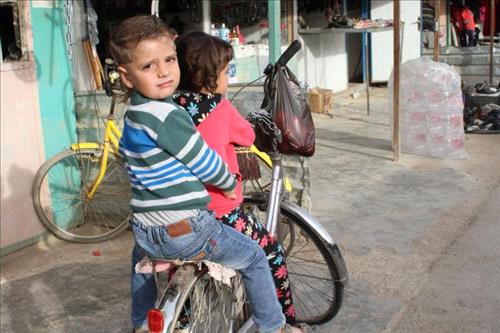Ammon News - AMMONNEWS - In a crowded maternity clinic at a refugee camp in Jordan near the Syrian border, Elhem cradled her crying 11-month-old son, bounced him on her knee and then handed him to her mother to help calm him down.
"When I had the baby I felt a sense of motherhood and was happy," the Syrian refugee said through a translator, adjusting her floral niqab. "I'm a housewife now."
She's 17, and her experience is common. Elhem, who asked to be identified by her first name, says many Syrian girls in the camp are also mothers, including a friend who gave birth at the age of 15.
Despite efforts to reduce early marriage in Zaatari camp since its opening in 2012, maternal health workers from the United Nations Population Fund (UNFPA) say the number of babies born to adolescent girls remains stubbornly high.
More than 15 million girls worldwide are married before they turn 18, according to campaign group Girls Not Brides.
Child marriage deprives girls of education and opportunities, and puts them at risk of serious injury or death if they have children before their bodies are ready.
In Jordan, Zaatari sprouted in an area that had been an empty desert, transforming in just a few short years into a sprawling slum city currently housing nearly 80,000 Syrians.
Since UNFPA began its operations in Zaatari in mid-2013, doctors have delivered more than 6,500 babies in the camp - 5 percent of them born to mothers younger than 18.
Girls Not Brides estimates about 13 percent of girls in Syria are married before their 18th birthday, and 3 percent become brides before they turn 15.
But the child marriage rate among Syrian refugees in neighboring Jordan is far higher - more than doubling to 25 percent in 2013, from 12 percent in 2011 when the war began, said the U.N. children's agency UNICEF.
The charity Save the Children says many Syrian refugee families marry off their daughters to provide them financial security or protect them from sexual violence perpetrated by other men in refugee camps.
"VERY HARD TO CONVINCE THEM"
When Elhem fled her hometown of Daraa in Syria, she did not imagine that two years later in 2014, she would get married at age 13 to her older cousin in Zaatari camp.
She said it was not a decision borne out of love or romance, but did not elaborate further.
Elhem said she has never been to school, which UNFPA says is a key risk factor for child marriage.
With no schooling or sexual education, generations of girls and women are not aware of the physical, mental and sexual health risks associated with early marriage.
"It's very challenging, it's very hard to convince them not to marry young," said Samah Al-Quaran, a UNFPA health worker in Zaatari camp.
Girls who marry young are more vulnerable to domestic and sexual violence, said Al-Quaran.
"The risk of gender-based violence is higher in early marriage because the girl doesn't understand what her husband is allowed or not allowed to do," the Jordanian health worker said, adding that the maternity clinic also provides round-the-clock assistance for victims of domestic and sexual violence.
